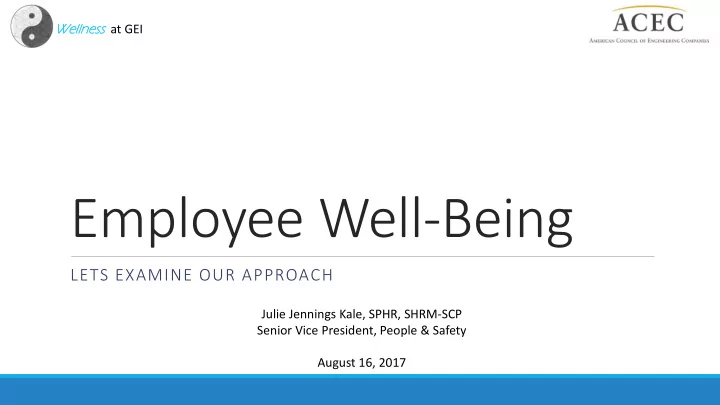

Wel ellness at GEI Employee Well-Being LETS EXAMINE OUR APPROACH Julie Jennings Kale, SPHR, SHRM-SCP Senior Vice President, People & Safety August 16, 2017
Wel ellness at GEI My Background Education Professional Experience 20+ years’ experience in B.S., Business (HR Management) Human Resources & Safety in a California State University, Sacramento variety of industries M.S., Health & Wellness, with a SPHR and SHRM-SCP Graduate Certificate in Physiology & Anatomy American College of Healthcare Sciences (ACHS) Doctorate, Naturopathy (unaccredited) Trinity College of Natural Health
Wel ellness at GEI Lets Talk Wellness….
Wel ellness at GEI The Past: Outdated Paradigms • Wellness is solely a focus on physical health (primarily diet & exercise). • Employees need to focus on wellness on their own time. • Wellness is a personal lifestyle choice of “health nuts” and outside the parameters of the workplace. • An employer’s only interest in wellness is to contain escalating benefits premiums and reduce use of sick days. • Wellness initiatives consist of smoking cessation programs, gym & commercial diet program discounts, etc. • Wellness is measured by collecting physical health biometrics (weight, BMI, cholesterol & glucose levels, blood pressure, etc.) • Stress is handled by giving employees a referral to an Employee Assistance Program.
Wel ellness at GEI What is Wellness (or Well-Being)? Wellness is a conscious, self-directed and evolving process of achieving full potential Wellness is multidimensional and holistic, encompassing lifestyle, mental and spiritual well-being, and the environment Wellness is positive and affirming Source: National Wellness Institute
Wel ellness at GEI So What Are Employers To Do About It?
Wel ellness at GEI What if….
Wel ellness at GEI …we view our employees as…
Wel ellness at GEI …our grea eates est asset?
Wel ellness at GEI What if….
Wel ellness at GEI …we take a deeper interest in who they are as a whole? The reality is, all of their life experiences accompany them into the workplace (for better or worse).
Wel ellness at GEI What if….
Wel ellness at GEI …we begin seriously examining & learning from. …what neuroscience is teaching us. …and practices outside of traditional allopathic medicine.
Wel ellness at GEI It’s time for U.S. employers to make major shifts in the environments created for employees… ...especially our industry – we’re in the business of employing knowledge- workers.
Wel ellness at GEI Stress AN EXAMINATION
Wel ellness at GEI What is Stress? “Stress is the brain’s response to any demand.” ~National Institute of Mental Health Source: 5 Things You Should Know About Stress, National Institute of Mental Health
Wel ellness at GEI The Yerkes-Dodson Curve Source: Managing Stress: Principles & Strategies for Health and Well-Being, B. Seaward, Ph.D., 2015; Natural Onsite Wellbeing, n.d.
Wel ellness at GEI Why is Stress Management Important? According to the American Institute of Stress: 43% of adults suffer adverse health effects due to stress. Stress has been linked to major illnesses & leading causes of death. Stress weakens the body’s physiological systems, thereby rapidly advancing the disease process. Including impairing the immune system A 2015 survey “Stress in America” reported that money and work are the top two stressors. The American Psychological Association reported in 2016 that in the previous year alone, one-third of adults reported an increase in their stress level. 24% of adults reported “extreme stress” (+18% increase from the previous year) Source: Managing Stress: Principles & Strategies for Health and Well-Being, B. Seaward, Ph.D., 2015
Wel ellness at GEI The Neuroscience of Stress Chronic Stress Can: Disrupt synapse regulation, which can result in loss of sociability & avoidance of interaction with others. Kill brain cells and reduce the size of the brain (prefrontal cortex), affecting memory and learning. Increase the amygdala (fear center), making the brain more receptive to stress. Neuroplasticity Age is directly correlated to the reversibility of stress- related damage to the brain. Activities that combat stress’ effect on the brain can benefit people of all ages. Source: The Mind and Mental Health: How Stress Affects the Brain, R. Bernstein, 2016
Wel ellness at GEI TED-Ed Video: How Stress Affects Your Brain
Wel ellness at GEI Split-Brain Theory
Wel ellness at GEI Stress’ Impact on Knowledge Workers “When a company hires an employee, they are essentially hiring that person’s brain and hoping it’s a smart brain that will grow even smarter with experience. But place that person in a high pressure work environment without the tools to transcend stress and the likelihood is that he or she will lose brain capacity.” ~Don Joseph Goewey, Stress, the Brain and the Neuroscience of Success
Wel ellness at GEI So What’s an Employer To Do? A few ideas… Talent Acquisition: Create processes that result in the recruitment and selection of talent that contribute to a positive work environment. Accountability for leadership and HR to foster positive work environments by boldly challenging high stress-inducing circumstances or people that need to be addressed. Teach and offer opportunities in the workplace (or other convenient locations) to learn and engage in healthy stress coping mechanisms. Realistic, updated conversations, tools and resources to support work-life balance (“work-life integration”). Teach and support healthy decision making, goal setting, priorities (professional & personal).
Wel ellness at GEI What else can we do?
Wel ellness at GEI Thank You!
Recommend
More recommend